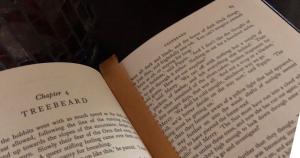 “We cannot go back! Do not be so nostalgic!”
“We cannot go back! Do not be so nostalgic!”
So says a certain kind of Evangelical, often young, though sometimes merely playing young in the morning mirror.
We know they are wrong, because they are reviving (at best) eighteenth century Whiggery where if one merely listened to what our betters were saying and looked at what they were producing, we would see that history was inexorably, with some downs to our ups, getting better. Whiggery is the idea that keeps coming back that says we cannot go back: an undead philosophy that denies the existence of zombies.
There was (we were told then when I was young) “No going back.” My dad was told that in seminary. His dad was told that in advertising. There is no going back, Satan might remind us, the way to Eden is barred, but the City of God is still ahead of us. Things are not worse (over all) necessarily, but they are not better over all necessarily.
There is no going back in totality, but ideas and moral fashions do come and go.
At worst, this Evangelical Whiggery is a revival of American Babbitry, a kind of college educated acceptance of the spirit of the age, that “somehow someway things are getting better every day” if only one takes seriously what the educated ten percent tell us. We must speak to the young people who are (we are told) not going to listen if we are so nostalgic.
Just so – as far as concerns nostalgia, a fondness for airbrushed memory that is certainly no basis for a culture. The options are not soft headed nostalgia or heartless reaction versus Progress. Those are the choices of Walt Disney in Tomorrowland, not Christians. We honor the wisdom of the past and look to the consumation of the Kingdom yet to come. Our saints are not perfect, but we are skeptical of the perfection of the present.
Whiggery is the recourse of the lightly read proud of their reading. The Whig was often the ignorant Tory sent off to Oxford who discovered The Dad’s rumbling rants about the decline of the Empire beginning with Peel could not hold up. Things were Not So Bad and so youth adopts whatever ideas are rumbling about the College at the time and then does the Church the favor of staying about, pained to do so, but still with us.
The Whig may not like us, but he surely wants to run our organizations. The Whig was right that the old Dad was wrong to be reactionary, he was wrong to fall into declinism where somehow someway things are getting worse every day. The youngling was right to rejoice in moral progress, but wrong to see it everywhere. If there is no Golden Age to which we can return, and there is not this side of Eden, then there is no moment when everything is awesome or even more awesome than ever.
Life is a muddle: some things are better, some worse.
Against making Christendom great again or thinking that finally (if we will only listen to the spirit of the age) Christendom finally is getting great, is the Christian idea that Christendom was great, with flaws, is great, with flaws, and will be great, with flaws.
The flaws change, the greatness does not.
The Case for Whiggery: We are SO much more enlightened than our parents.
And if making our present physical lives longer and more comfortable is progress, then Whiggery is for the moment looking good in much of the world.
Of course, such improvements may come at a soul sucking spiritual cost or by filling the oceans with plastics. Killing the trees so we can get the right food products in the right housing with as many options for pleasure as possible may be one kind of progress, but one need not go the full Tolkien (“I am for the trees.”) to see that the progress is mixed.
We may have, in fact, adopted in the West a view of sexuality that is demographic doom and damnable. We may have lost the future: temporal and eternal. Yet no sane person could deny that our long battle in America against racism and for diversity is good. We are more tolerant and that is excellent. We are, in some quarters, less cruel and that is good, though Twitter gives me pause on both the Evangelical left and right.
Things are better in some ways and worse in others: precisely the Christian belief. Against this the Christian college Whig replaces a classical and progressive education with merely knowing to be anti-Trump or pained about supporting some moral position the Church in most of the world holds, but that is bad in mostly white, mostly rich, mostly Western communities that they attend.
They may know no Greek, but they know the right postures.
After all, we do not have to guess about Whiggery: Russia shows it wrong. The youth that went to college, even the Christians, became convinced that nothing could be worse than Tsardom. We had to go forward into the spirit of the age. Of course, the Jack London, socialist, spirit of the age was racist, ugly, Soviet, but it was the future. The Soviet Union was worse, of course, in every way. Any vice of Tsardom (and there were multitudes) were multiplied, but there were virtues lost to Bolshevism.
We had kids in Soviet schools reading books that extolled the ideas of the mass murderer that ran the nation. Literarcy was up as was genocide. I can imagine that if I had written then, some Evangelical would have told me: “We cannot go back, do not be nostalgic. The Soviets are here to stay.”
In fact, I do not have to imagine, since this happened to me. My anti-communism was dismissed as nostalgia then, though the fact that I was in my early twenties made this hard on my fifty-something Evangelical critics. Now that I am fifty-something, I am easier to dismiss as I suggest that much of our present Western culture is as wrong headed as the Soviets: even if the grain elevators are full.
I am, after all, old and so I am told nostalgic, ageism evidently not yet having faded from the Whig mind. Pepsi has advertised for a century that we in this particular now will be too smart to drink Coke. There is no going back.
Yet still (as I did as a young man) I fight Whiggery with all my might as I fight the forces of reaction (damn the alt-Right). Things are better and worse and I refuse to buy one or the other: I am for the trees and liberty. I am for sexual ethics and tolerance. I venerate my ancestors and know they made messes. I am for fixing the messes knowing we are making messes of our own.
We can do more than our parents, we have more options. This is mostly good, but are we more holy? In some areas, say racism, perhaps getting there. In other areas, say sexual ethics, less so. We are kindly decadents with excellent retirement plans eager to make everyone else kindly, decadent, with excellent retirement plans.
I have seen the Parthenon and downtown New York and see progress and regression.
The Essential Problem with Whiggery: Ideas and Thinking
Ideas do not come with expiration dates. If mathematical objects exist, then the discovery that they do and many of the implications is not made less plausible because Pythagoras said it long ago. Blake had it:
And did those feet in ancient time,
Walk upon Englands mountains green:
And was the holy Lamb of God,
On Englands pleasant pastures seen!
And did the Countenance Divine,
Shine forth upon our clouded hills?
And was Jerusalem builded here,
Among these dark Satanic Mills?
Bring me my Bow of burning gold;
Bring me my Arrows of desire:
Bring me my Spear: O clouds unfold!
Bring me my Chariot of fire!
I will not cease from Mental Fight,
Nor shall my Sword sleep in my hand:
Till we have built Jerusalem,
In Englands green & pleasant Land.
This is the best of times and the worst of times. Whigs are too optimistic and should go read some Plato. Reactionaries are too pessimistic and should go to LACMA. We are building Jerusalem here, but will never get it done properly until King Jesus returns.
We have fallen from Eden, are redeemed on Calvary, and are headed toward the City of God.
God help us get there without looking back to Eden or longing for the fleshpost of this present Egypt.












